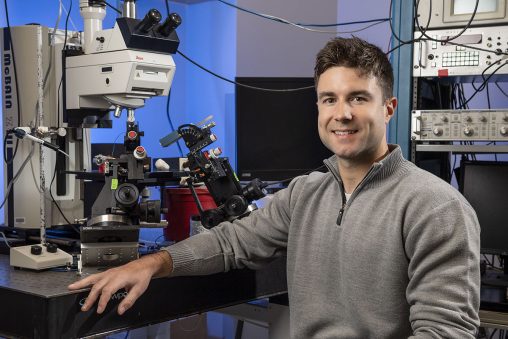
Former Raider and professional soccer player Christopher Dupont returned to Wright State to conduct research in hyperkalemic periodic paralysis while pursuing M.D. and Ph.D. degrees.
Christopher Dupont, a dual M.D./Ph.D. student at Wright State University, definitely had different plans for his life when he started his academic journey.
A native of Montreal, Canada, Dupont is the first in his family to go to college and earn a degree but soccer was his first love.
Dupont left Canada at the age of 17 and played professional soccer in Geneva, Switzerland, for two years and then in Metz, France, for a year before coming to the United States and accepting a soccer scholarship at Wright State. Even then, he was still certain that his path would eventually lead him back to the world of professional soccer.
“When I came to Wright State, I spoke almost no English. At first, it was extremely challenging to go to college classes in a foreign language,” he said. “I decided to enroll as a physics major because I was always good at science in high school, and I thought a science major would have the least amount of writing. Honestly, I wasn’t sure how long I would stay at Wright State.”
Dupont eventually left school to resume his professional soccer career, but his time at Wright State stuck with him.
“I discovered that I really enjoyed learning and it was always in the back of my head that I might return to Wright State to complete my physics undergraduate degree someday,” he said.
Ultimately, he realized that his soccer career was coming to an end and decided to shift his focus on something that was more long-term.
“I decided to come back to Wright State to complete my final semester before I could graduate with my undergraduate degree in physics,” he said.
During his last semester, he started working in the lab of Mark Rich, M.D., Ph.D., professor of neuroscience, cell biology and physiology and professor of neurology, researching inherited neuromuscular diseases.
“As a physician himself, he greatly influenced me in pursuing a career in medicine,” Dupont said.
Dupont applied to the M.D./Ph.D. dual degree program at Wright State’s Boonshoft School of Medicine and College of Science and Mathematics with the goal of continuing his research in Rich’s lab.
His research involves the study of rare, inherited diseases affecting skeletal muscles. Currently, he focuses on hyperkalemic periodic paralysis, which presents as temporary periods of severe muscle weakness or paralysis.
“People usually start having attacks of muscle paralysis when they are very young and oftentimes don’t know why, since this disease is somewhat rare,” Dupont said. “Currently, the best treatment is to avoid the triggers leading to the attacks of muscle weakness, which is why I believe progress can be made in treating the disease.”
Dupont said that the attacks of paralysis can last from minutes to several months in the worst cases. It can be very debilitating, and some patients will become weaker and weaker as they age and need to use a wheelchair, he said.
Dupont recently received an F30 grant from the National Institute of Arthritis and Musculoskeletal and Skin Disease for his research.
“My mentors and I thought it would be beneficial for my training as a future physician-scientist to apply for the F30 grant,” he said.
The grant will support Dupont financially through the rest of his Ph.D. and M.D. studies and provide funds to attend conferences and present his research, which he did this year in Italy.
Dupont is in the second year of the Ph.D. in Biomedical Sciences program, will resume the M.D. program in 2024 and expects to graduate in 2026. After graduation, he hopes to pursue a career as an orthopedic surgeon, which he believes will be a good way to mesh his passion for athletics and medicine.

 Walking through open doors
Walking through open doors  Adventures await
Adventures await  Wright State to expand nursing facilities to meet workforce needs and prepare more graduates for in-demand careers
Wright State to expand nursing facilities to meet workforce needs and prepare more graduates for in-demand careers  Wright State student-athletes make a lasting impact on local family with more to come
Wright State student-athletes make a lasting impact on local family with more to come  Wright State names Rajneesh Suri dean of Raj Soin College of Business
Wright State names Rajneesh Suri dean of Raj Soin College of Business 